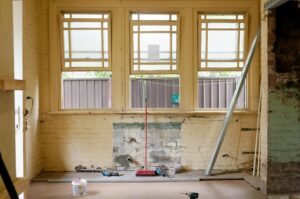Introduction
Embarking on a home renovation project is an exciting opportunity to transform your living space into your dream home. However, the process can be complex and challenging, and even small mistakes can lead to costly setbacks. At PD Home Renovations Inc., we understand the intricacies of home renovation and are committed to delivering quality results and exceeding your expectations. Whether we’re working on foundational plans or fine-tuning finishing touches, our goal is to create beautiful and functional spaces that you’ll love for years to come. To help you navigate the renovation process smoothly, here’s expert advice on common mistakes to avoid during your home renovation.
1. Skipping the Planning Phase
One of the most critical mistakes homeowners make is skipping or rushing the planning phase. Proper planning is essential to ensure your renovation is successful and meets your needs and expectations.
Why Planning Matters:
- Clarity of Vision: Detailed planning helps you define your vision and set clear goals for your renovation project. It ensures that you know exactly what you want and how to achieve it.
- Budget Management: A well-thought-out plan includes a budget that outlines all expected costs, including materials, labor, and contingencies. This helps prevent overspending and financial surprises.
- Timeline: Planning helps establish a realistic timeline for your project, ensuring that you understand how long the renovation will take and can prepare accordingly.
Tips for Effective Planning:
- Set Clear Objectives: Define your renovation goals and priorities. Consider what changes you want to make and why they are important to you.
- Consult with Professionals: Work with experienced professionals, such as designers and contractors, to create a detailed plan and get expert advice.
- Create a Detailed Budget: Include all potential expenses and allow for a contingency fund to cover unexpected costs.
2. Neglecting Permits and Regulations
Failing to obtain the necessary permits and adhere to local regulations can lead to legal issues, delays, and additional costs. Permits ensure that your renovation complies with building codes and safety standards.
Why Permits Matter:
- Legal Compliance: Building permits are required for many types of renovations and ensure that your project meets local codes and regulations.
- Safety: Permits help ensure that your renovation is safe and that all work is done correctly, reducing the risk of potential hazards.
- Future Sales: Having proper permits can impact the value of your home and prevent issues when selling in the future.
Tips for Navigating Permits:
- Research Requirements: Check with your local municipality to understand the permit requirements for your renovation project.
- Work with Professionals: Experienced contractors and renovation experts are familiar with the permitting process and can help ensure compliance.
- Submit Applications Early: Allow ample time for permit approvals to avoid delays in your project timeline.
3. Underestimating the Costs
Budget overruns are a common issue in home renovations. Underestimating the costs can lead to financial strain and project delays. It’s important to have a realistic understanding of the expenses involved.
Why Budgeting Matters:
- Cost Management: Accurate budgeting helps you manage your finances and avoid overspending. It ensures that you can complete your renovation without unexpected financial strain.
- Scope of Work: Understanding the full scope of work and associated costs helps you make informed decisions about what’s feasible within your budget.
- Contingency Planning: A well-prepared budget includes a contingency fund to cover unexpected expenses and unforeseen issues.
Tips for Accurate Budgeting:
- Get Detailed Quotes: Obtain detailed quotes from contractors and suppliers to understand the costs involved in your renovation.
- Include All Expenses: Consider all potential costs, including labor, materials, permits, and contingency funds.
- Track Expenses: Keep track of all expenses throughout the project to ensure you stay within budget.
4. Choosing the Wrong Contractor
Selecting the right contractor is crucial to the success of your renovation. Choosing an inexperienced or unreliable contractor can lead to subpar work, delays, and additional costs.
Why Contractor Selection Matters:
- Quality of Work: A skilled and experienced contractor ensures that the work is done to a high standard and meets your expectations.
- Timeliness: A reliable contractor will adhere to the project timeline and complete the work as scheduled.
- Communication: Effective communication with your contractor is essential for a smooth renovation process and resolving any issues that arise.
Tips for Choosing a Contractor:
- Research and Referrals: Research potential contractors and seek referrals from friends, family, or online reviews.
- Check Credentials: Verify that the contractor is licensed, insured, and has a good track record of successful projects.
- Get Multiple Quotes: Obtain quotes from several contractors to compare pricing and services.
- Review Contracts: Carefully review and understand the contract before signing, including the scope of work, timeline, and payment terms.
5. Ignoring Design and Functionality
Focusing solely on aesthetics without considering functionality can lead to a renovation that looks great but doesn’t meet your practical needs. It’s important to balance design with functionality.
Why Design and Functionality Matter:
- Usability: A well-designed space should not only look good but also be practical and functional for your daily needs.
- Comfort: Consider how the design impacts comfort and convenience, such as lighting, storage, and flow.
- Future Needs: Think about how your needs might change over time and ensure that the design accommodates future requirements.
Tips for Balancing Design and Functionality:
- Work with Designers: Collaborate with interior designers or architects to create a design that is both visually appealing and functional.
- Consider Traffic Flow: Plan the layout to ensure smooth traffic flow and accessibility within the space.
- Incorporate Storage Solutions: Include adequate storage options to keep the space organized and clutter-free.
6. Overlooking the Importance of Quality Materials
Using low-quality materials to save money can compromise the durability and longevity of your renovation. Investing in high-quality materials ensures that your renovation stands the test of time.
Why Material Quality Matters:
- Durability: High-quality materials are more durable and resistant to wear and tear, reducing the need for frequent repairs or replacements.
- Appearance: Quality materials contribute to a more polished and professional finish, enhancing the overall look of your renovation.
- Value: Investing in quality materials can increase the value of your home and improve its appeal to potential buyers.
Tips for Selecting Quality Materials:
- Research Material Options: Research different material options and their pros and cons to make informed choices.
- Choose Reputable Brands: Opt for materials from reputable brands known for their quality and reliability.
- Consult with Professionals: Seek advice from renovation experts on the best materials for your project and budget.
7. Failing to Communicate Clearly
Effective communication with your contractor and renovation team is essential for a successful project. Failing to communicate clearly can lead to misunderstandings, delays, and dissatisfaction.
Why Communication Matters:
- Project Clarity: Clear communication ensures that everyone involved understands the project scope, goals, and expectations.
- Issue Resolution: Effective communication helps address any issues or concerns promptly, preventing them from escalating.
- Alignment: Ensures that the renovation aligns with your vision and preferences.
Tips for Effective Communication:
- Set Expectations: Clearly outline your expectations and preferences at the beginning of the project.
- Regular Updates: Schedule regular updates and check-ins with your contractor to monitor progress and address any issues.
- Document Changes: Keep written records of any changes or agreements made during the renovation process.
Conclusion
Avoiding common mistakes during your home renovation can help ensure a successful and satisfying project. From thorough planning and budgeting to selecting the right contractor and materials, every detail matters in achieving your renovation goals. At PD Home Renovations Inc., we are committed to providing quality service and exceeding your expectations. Our team is passionate about creating beautiful and functional spaces that you will love for years to come.To book an appointment or learn more about our renovation services, please contact us at https://pdrenovations.ca/contact-us/. Let us help you navigate your renovation project and transform your home into a space you’ll cherish.







